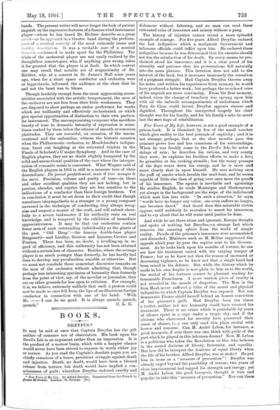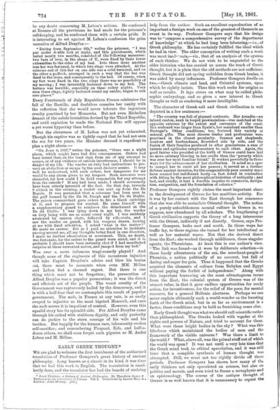BOOKS.
D RE YF1JS.*
IT may be said at once that Captain Dreyfus has the gift neither of romance nor of observation. His book upon the Devil's Isle is an argument rather than an impression. It is the product of a narrow brain, which with a happier chance would never have been stirred to express in words either joy or sorrow. .As you read the Captain's desolate pages you are chiefly conscious of a brave, persistent struggle against death and injustice. Death, no doubt, would have been a blessed release from torture, but death would have implied a con- sciousness of guilt; wherefore Dreyfus endured cruelty and • Pm Fears of My Life. My aura Dreyfus. Translated from the French by James blortimer. London : Newnes. [6s.]
dishonour without faltering, and no man can read these reiterated cries of innocence and misery without a pang.
The history of injustice cannot reveal a more splendid example of courage. For five years Alfred Dreyfus endured.
the last indignities which a malignant Government and infamous officials could inflict upon him. He endured these indignities because he was determined that his enemies should. not win the satisfaction of his death. By every means he pro- claimed aloud his innocence, and it is a clear proof of his sincerity and patience that his protestations fall naturally into the same phrases. This iteration does not add to the interest of the book, but it increases immensely the sensation of a poignant struggle. Had Captain Dreyfus thrown away his notes, and written his experiences from memory, he would have produced a better work ; but perhaps the re-echoed cries of his anguish are more convincing. From the first moment, indeed, when the charge of treachery was sprung upon hi with all the imbecile accompaniments of melodrama which Paty du Clam could invent, Dreyfus appears sincere and dignified. Throughout the unexpected tragedy his chief thought was for his family, and for his family's sake he never lost the sure hope of rehabilitation.
Five Years of My Life, however, is not a good example of a prison-book. It is illumined by few of the small touches' which give reality to the best journals of captivity ; and it ia not strange, perhaps, that as the slow months pass the prisoner grows less and less conscious of his surroundings. When he was freshly come to the Devil's Isle, he notes a deluge of rain ; he describes his rations, and very scanty they were ; he explains his fruitless efforts to make a fire ; he grumbles at his cooking utensils ; but the weary passage of the days wears down his energy, and he is more and more closely shut in upon himself. He sees nothing save the puff ot smoke which heralds the mail-boat, and he seems capable of little else than of going over once more the proollt of his innocence. The egoism is inevitable and agonising. He studies English, he reads Montaigne and Shakespeare a yet always in the background are the steps of the indictment which sent him into exile. "In such a situation," he says, "words have no longer any value ; one even suffers no longer, one becomes dazed." And dazed does this miserable victim appear, until suddenly he reawakes to assert his innocence, and to cry aloud that he will resist until justice be done.
And while he sat there alone and ignorant, Europe thought and spoke of nothing but Dreyfus,—a strange fact which removes the amazing afaire from the world of simple reality. Proofs of the prisoner's innocence were accumulated and discarded ; Ministers such as M. Meline suppressed the appeals which year by year the captive sent to his Govern- ment. As he looks back upon his months of torture, he can see how his treatment varied with the varying temper of France; but as he knew not then the reason of increased or decreasing vigilance, so he knew not that a single hand had been raised in his defence. But while the history which he made in his own despite is now plain to him as to the world, the recital of his tortures cannot be pleasant reading for honourable Frenchmen. A more wanton piece of cruelty is not revealed in the annals of despotism. The Man in the Iron Mask never suffered a tithe of the moral and physical indignities to which Captain Dreyfus was exposed. Nor can democratic France shield herself behind an honest conviction of her prisoner's guilt. Had Dreyfus been ten times a traitor, neither law nor humanity could have excused his treatment. There is no crime which is punishable by year.' of silence spent in a cage under a tropic sky, and if the citizens who clamoured for severity have preserved their sense of shame, t'h,_y can only read this plain recital with horror and remorse. Can M. Andre Lebon, for instance, a, good bourgeois, if ever there was one, think with pride of the part which he played in this inhuman drama? Now. M. Lebon is a politician who takes the Revolution en bloc, who believes in the sacred doctrine of liberty, fraternity, and equality. But how did he interpret the doatrine of equal liberty when the life of his brother, Alfred Dreyfus, was at stake ? He put him in irons as a "measure of precaution " ! Dreyfus was already caged beyond the possibility of rescue; two years of close imprisonment had sapped his strength and energy ; yet M. Andre Lebon, the good bourgeois, thought it wise and popular to take this "measure of precaution." Nor can there • be any doubt concerning M. Lebon's actions. He confessed at Rennes all the provisions he had made for the prisoner's
• safekeeping, and he confessed them with a certain pride. It is interesting to set against M. Lebon's confession the grim narrative of Alfred Dreyfus :—
"Dating from September 6th," writes the prisoner, "I was put under cicuble lock at night, and this punishment, which lasted nearly two months, consisted of the following measures: two bare of iron, in the shape of IL were fixed by their lower extremities to the sides of my bed. Into these irons another iron bar was fastened, to which two rings were attached. At the extreme end of this bar on one side was a solid terminal, and on the other a padlock, arranged in such a way that the bar was fixed to the irons, and consequently to the bed. Of course, when my feet were fixed in the two rings there was no possibility of my moving ; I was invariably fastened down to my bed. The torture was horrible, especially on these sultry nights. Very soon these rings, tightly fastened round my ankles, began to rub sore places."
Every Fourteenth of July Republican France celebrates the fall of the Bastille, and doubtless consoles her vanity with the reflection that she would never tolerate the ingenious cruelty practised by her Monarchs. But not even Richelieu dreamt of the subtle brutalities devised by the Third Republic, and until expiation be made the National Fete will appear a yet worse hypocrisy than before.
But the cleverness of M. Lebon was not yet exhausted. Though his captive was so tightly caged that he had not seen the sea for two years, the Minister deemed it expedient to plan a night alarm ;—
" On June 6, 1897," writes the prisoner, "there was a night alarm, which might have had dire consequences. Orders had been issued that, on the least sign from me of any attempt to escape, or of any evidence of outside interference, I should be in danger of my life. The warder on duty had instructions to pre-
- vent an abduction or escape by the most decisive means, It may well be understood, with such orders, how dangerous for me would be any alarm given to my keepers. Such measures were shameful, for how could I be held responsible for any attempt from the outside ? If any had been made, I should necessarily - have been utterly ignorant of the fact. On that day, towards 9 o'clock in the evening, a rocket was sent up from the Ile Royale. It was pretended that a schooner had been seen in the gulf formed by the Ile St. Joseph and the De du Diable. The prison commandant gave orders to fire a blank cartridge
. at it, and to prepare for combat. He came himself with a supplementary guard to reinforce the detachment at the He du Diable. I was lying down in my hut, the warder on duty being with me as usual every night. I was suddenly awakened by cannon shots, followed by rifle-shots, and I saw the warder on guard, with his weapons drawn, looking at me with fixed attention. I asked what is the matter ?' Be made no answer. But as I paid no attention to incidents passing around me, all my thoughts being fixed in one direction, I made no further observation or movement. This, no doubt, was fortunate, for the orders to the guard were strict, and it is probable I should have been instantly shot if I had manifested surprise at these unwonted noises, and jumped from my bed."
Was ever a more infamous tragi-comedy played ? And though none of the engineers of this monstrous injustice will take Captain Dreyfus's advice and blow his brains
out, there must be moments when even MM. Meline and Lebon feel a shamed regret. But there is one thing which must not be forgotten; the persecution of Alfred Dreyfus was a popular persecution; it was the direct and efficient act of the people. The worst cruelty of the Government was rapturously bailed by the democracy, and it is with a half-fear that we contemplate this result of popular government. The mob, in France at any rate, is as easily swayed to injustice as the most bigoted Monarch, and once the mob moves it is impatient of control. However, even this squalid story has its splendid side. For Alfred Dreyfus came • through his ordeal with stubborn dignity, and only posterity can do justice to the stern courage of his wife and his brother. But happily for the human race, inhumanity evokes self-sacrifice; and remembering Picquart, Zola, and half-a- dozen others, we shall soon forget such pigmies as M. .Andre Lebon and M. Mane.







































 Previous page
Previous page